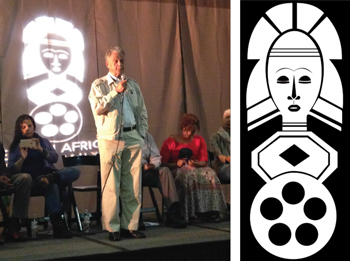By Charlene Muhammad CHARLENEM

LOS ANGELES (FinalCall.com) – The 23rd Annual Pan African Film and Arts Festival is continuing its mission to shatter America’s false imagery and negative depiction of Black people through films showcasing Black power, Black love, Black art, and forums.
The February festival opened with the West Coast premiere of the film, “The Black Panthers: Vanguard of the Revolution” and the gathering of filmmakers, artists, poets and celebrities closed Feb. 16.
“All these films are here. Young people came from across the planet for 10 days to bring their different messages, along with artists from all over the world,” said film festival founder Ayuko Babu.
Mr. Babu grew up under the influence of the Honorable Minister Louis Farrakhan and the Rev. Jesse Jackson, and was just 12-years-old when Rosa Parks refused to give her seat on a bus to a White male, starting the Montgomery Bus Boycott.
His childhood experiences are one reason the event has held a Student Festival Program for more than two decades. Each year 6,000 to 7,000 Los Angeles city and county students and their teachers attend the free program, which showcases films dealing with issues like teen pregnancy, HIV/AIDS, literacy and gang prevention.
The festival also features the PAFF Institute, an array of panels and workshops led by industry leaders. In the session “Christianity on Trial in Film: Examining the Historical Credibility of Biblical Epics on the Big Screen,” biblical historians and Christian filmmakers discussed the historical facts behind epics such as “Noah,” “Exodus” and the “Bible Miniseries.”
In another session, legendary actor Denzel Washington talked about his life, love, passions and career. Other workshops hosted by actors, directors and producers provided insight and techniques for industry success.
The Pan African Film Festival is an independent institution that depends on independent support, said Mr. Babu.
On Feb. 8, REVOLT TV sponsored a special forum, “Black Lives Matter: Then and Now,” in the Bridge, an area of the Baldwin Hills Crenshaw Plaza overlooking historic Crenshaw Boulevard. More than 200 people gathered to hear panelists, including Patrice Cullers, who talked about the creation of the #Black Lives Matter movement.
The message came in a spontaneous moment after a Florida jury acquitted George Zimmerman of killing 17-year-old Black teen Trayvon Martin, she explained.
“It’s remembering who we are, why we’re here, and it’s a declaration, and it’s a call to action,” Ms. Cullers stated. In the six months since 18-year-old Black teen Mike Brown’s life was taken by then-Ferguson, Mo., police officer Darren Wilson, the #Black Lives Matter movement has opened new chapters, the latest in Ghana and Palestine. Blacks have visited and talked about the issues of oppression and injustice.
Dr. Melina Abdullah, a professor in the Pan-African Studies Department at California State University–Los Angeles, said the #Black Lives Matter movement isn’t about Black people’s pleas for Whites or others to see them. It’s a reminder to Blacks that they have the capacity to get free, she said.
Robert Farrell, a 1960s Freedom Rider during the civil rights movement who is now a Los Angeles city councilman, talked about the pre-organized, pre-structured and prepared methods youth used in 1960s to challenge unjust laws and policies. Youth got arrested strategically, were denied bail, and in a non-violent way, forced cases into federal court and forced discussions of rights and constitutional law, he said.
Erica Huggins and Hank Jones, former Black Panthers, focused on valuing the lives of Black women and living in a police state.
“Be kinder to women,” Ms. Huggins said. She noted there was virtual silence after police in Hearne City, Texas, killed 93-year-old Pearlie Golden. “We don’t hear those names … that doesn’t mean we don’t say the names of the men, but how are we valuing women? Because if we do not, we will die and our movements will continue to die,” Ms. Huggins said.
America is further from democracy now than ever, Mr. Jones said. He was raised to believe in the system and believe that by working hard, one could pull himself up by his bootstraps. That’s not an actual fact, Mr. Jones said. The system dehumanizes people and it’s like a Las Vegas gamble, where everybody pulls the lever, trying to get into middle class, upper middle class or top One Percent, he said.
But, Mr. Jones added, in order to do that, to be successful “you have to ignore people sleeping under these overpasses, on these sidewalks, that 99 Percent that is just barely striving to meet the mortgages and put food on the table and raise their children.”












